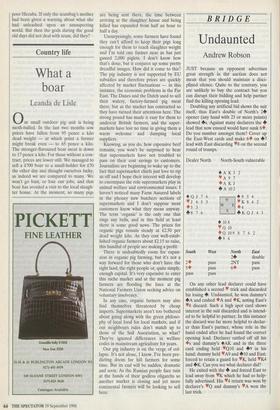Country life
What a boar
Leanda de Lisle
Our small outdoor pig unit is being moth-balled. In the last two months sow prices have fallen from 95 pence a kilo dead weight — at which point a farmer might break even — to 65 pence a kilo. The stronger-flavoured boar meat is down to 17 pence a kilo. For those without a con- tract, prices are lower still. We managed to sell a £700 boar to a small-holder for £70 the other day and thought ourselves lucky, as indeed we are compared to many. We won't go bust, or lose our jobs, and that boar has avoided a visit to the local slaugh- ter house. At the moment, so many pigs are being sent there, the time between arriving at the slaughter house and being killed has expanded from half an hour to half a day.
Unsurprisingly, some farmers have found they can't afford to keep their pigs long enough for them to reach slaughter weight and I'm told one farmer near us has just gassed 2,000 piglets. I don't know how that's done, but it conjures up some pretty dreadful images. How did it come to this? The pig industry is not supported by EU subsidies and therefore prices are quickly affected by market fluctuations — in this instance, the economic problems in the Far East. The Danes and the Dutch used to sell their watery, factory-farmed pig meat there, but as the market has contracted so they have turned their attentions here. The strong pound has made it easy for them to undercut British farmers, and the super- markets have lost no time in giving them a warm welcome and dumping local suppliers.
Knowing, as you do, how expensive beef remains, you won't be surprised to hear that supermarkets have not troubled to pass on their cost savings to customers. Journalists are beginning to wake up to the fact that supermarket chiefs just love to rip us off and I hope their interest will develop to encompass the role supermarkets play in animal welfare and environmental issues. I haven't noticed many Farm Assured labels in the phoney new butchers sections of supermarkets and I don't suppose most customers know what they mean anyway. The term 'organic' is the only one that rings any bells, and in this field at least there is some good news. The prices for organic pigs remain steady at £2.50 per dead weight kilo. As they cost well-estab- lished organic farmers about £2.15 to raise, this handful of people are making a profit.
There is undoubtedly room for expan- sion in organic pig farming, but it's not a way forward for those who don't have the right land, the right people or, quite simply, enough capital. It's very expensive to enter this niche market and at the moment pig farmers are flooding the lines at the National Farmers Union seeking advice on voluntary insolvency.
In any case, organic farmers may also find themselves threatened by cheap imports. Supermarkets aren't too bothered about going along with the green philoso- phy of local food for local markets, and if our neighbours rules don't match up to those of the Soil Association, so what? They've ignored differences in welfare codes in mainstream agriculture for years.
Our pig industry is on the verge of col- lapse. It's not alone, I know. I've been pre- dicting doom for hill farmers for some time. But its end will be sudden, dramatic and soon. As the Russian people face ruin at the hands of their godless oligarchs so another market is closing and yet more continental farmers will be looking to sell here.










































































 Previous page
Previous page